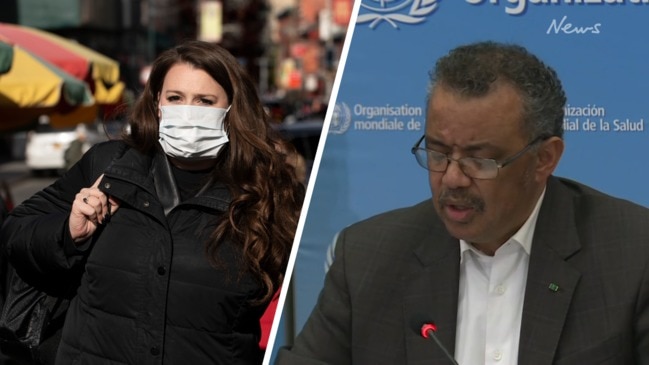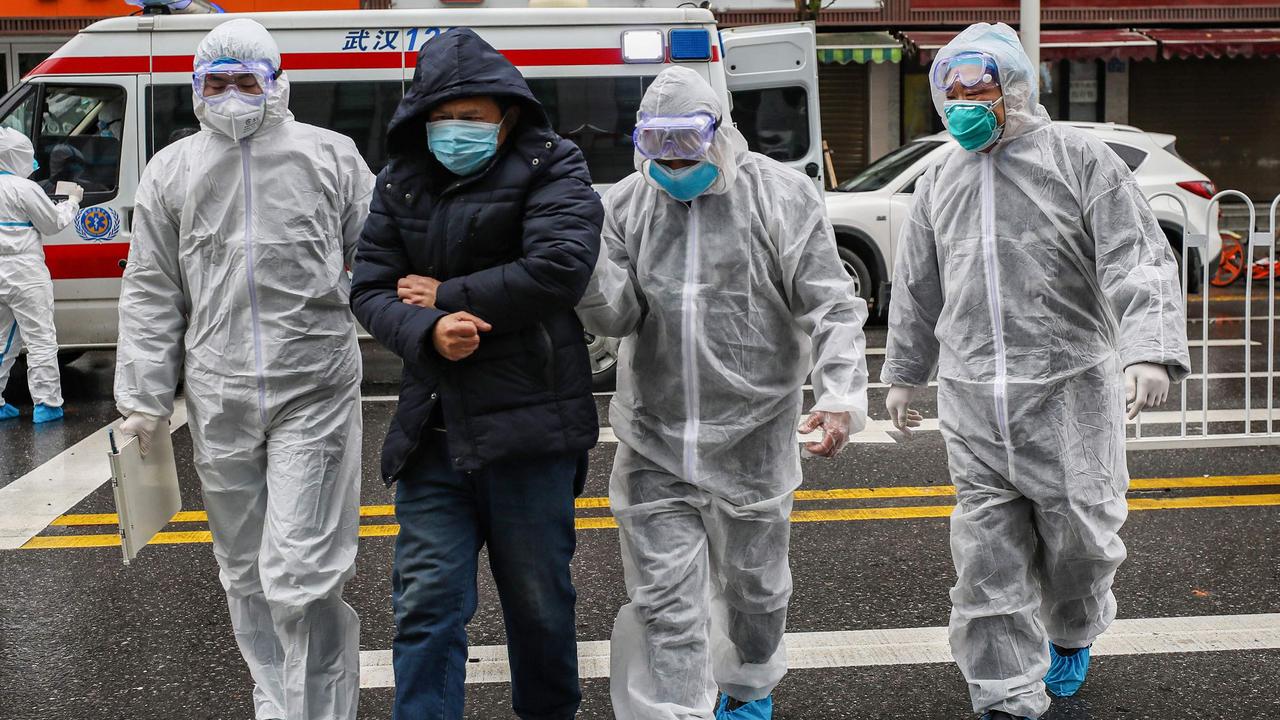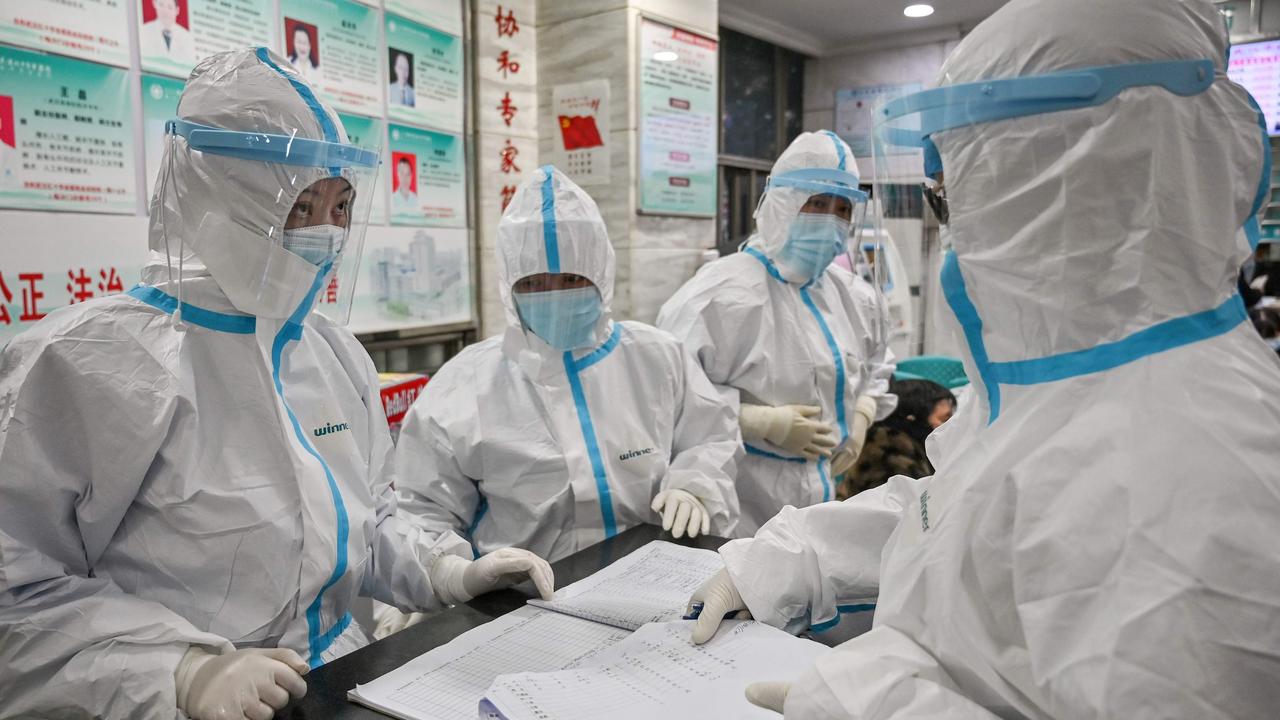World Health Organisation declares global emergency over coronavirus
The World Health Organisation has declared a global emergency over coronavirus after the number of cases spiked tenfold in a week.

The death toll from coronavirus has risen to at least 213 in mainland China after a horror day.
Authorities said 42 deaths has been tallied in Hubei.
Of the newly-reported deaths, 30 were in Wuhan – considered the epicentre of the outbreak.
The fast-spreading virus now covers all of China.
All 31 provinces have reported cases of the Wuhan coronavirus.
Beijing has sent more than 7000 medical staff to Hubei to try and stem the outbreak.
The total number of infections has surpassed 9692 – far exceeding the deadly 2002-03 SARS epidemic.
SARS killed about 10 per cent of people who caught it, much higher than the estimated 2 per cent death rate from the coronavirus, although that figure is still very preliminary.
The World Health Organisation today declared coronavirus a global emergency
Meanwhile, the United States and South Korea confirmed their first cases of the virus spreading person to person.
The man in the US is married to a 60-year-old Chicago woman who got sick from the virus after she returned from a trip to Wuhan.
There have been cases reported of the virus spreading to others in a household or workplace in China and elsewhere.
The case in South Korea was a 56-year-old man who had contact with a patient who was diagnosed with the virus earlier.
Human-to-human spread of the virus outside China has also occurred in Germany, Japan, Canada and Vietnam, and was a major reason the World Health Organisation convened its committee of experts to assess whether the outbreak warranted being declared a global emergency.
Outside China, there are 98 infections in 18 countries, according to the WHO. That figure rose from 82 this morning.
GLOBAL EMERGENCY DECLARED
The World Health Organisation declared the global emergency as the virus spreads from China to more than a dozen countries.
The number of confirmed cases has spiked tenfold in a week.
The UN health agency defines an international emergency as an “extraordinary event” that constitutes a risk to other countries and requires a co-ordinated international response.
“The main reason for this declaration is not because of what is happening in China, but because of what is happening in other countries,” WHO director-general Tedros Adhanom Ghebreyesus told reporters on Friday morning.
“Our greatest concern is the potential for the virus to spread to countries with weaker health systems, and which are ill-prepared to deal with it.”
China first informed WHO about cases of the new virus in late December.
To date, 8248 cases have been reported, and 212 people have died in China. Forty-two of those fatalities were reported on Friday.
Eighteen other countries have reported confirmed infections, as scientists race to understand exactly how the virus is spreading and how severe it is.
There are nine confirmed cases in Australia.
RELATED: Follow updates on the coronavirus outbreak
RELATED: First human-to-human transmission in the US
Experts say there is significant evidence the virus is transmitting among people in China and have noted with concern several instances in other countries - including Japan, United States, Germany, Canada and Vietnam - where there have also been isolated cases of human-to-human spread.
A declaration of a global emergency typically brings greater money and resources, but may also prompt nervous governments to restrict travel and trade to affected countries.
The WHO’s emergency committee chair, Professor Didier Houssin, sought to dissuade them from doing so, telling reporters such restrictions were not “an example to follow but a decision to reconsider”.
The emergency announcement also imposes more disease reporting requirements on countries.
Last week, WHO said it was “too early” to declare an international health emergency but on Friday said action was needed to help countries prepare for the possibility of it spreading further.
The virus has now infected more people in China than fell ill during the 2002-2003 severe acute respiratory syndrome (SARS) outbreak. The number of cases has jumped to more than 8200 globally, surpassing the 5327 people diagnosed with SARS.
RELATED Coronavirus is spreading faster than SARS
The death toll, currently standing at 212, is lower than the 348 people who died in China from SARS.

PM RESPONDS TO EMERGENCY DECLARATION
Scott Morrison held a press conference in Sydney this morning, where he responded to the WHO’s emergency declaration.
“Australia has been acting in advance of this decision. Australia has been acting and our states have been acting with an abundance of caution, and working in close co-operation,” the Prime Minister said.
“All of the issues - isolation, case management, contract tracing, prevention of onward spread, active surveillance, early detection - Australia has been doing these things and will continue to do them as we work together to ensure we contain and address any impact to Australian health and wellbeing.”
Mr Morrison reiterated that all people who are arriving in the country from Hubei province, or who have had contact with a confirmed case, are being advised to self-isolate for a fortnight in their homes.
DFAT is advising Australians to “reconsider” their need to travel to China in general, and is telling people “do not travel” to Hubei province.
“We are making arrangements to assist isolated and vulnerable Australians citizens to leave Wuhan and we’re well prepared, and will continue to follow the expert advice,” said Mr Morrison.
A ninth Australian case of the coronavirus was confirmed yesterday.
A 42-year-old Chinese national woman from Wuhan has the infection, in the second case for Queensland, the state’s health department confirmed.
There have been four cases in NSW and three in Victoria so far.
The latest woman was a member of the tour group travelling with the 44-year-old man confirmed to have the virus in Queensland earlier this week.
She is currently isolated in the Gold Coast University Hospital and is stable. Seven other people from the same tour group remain in isolation in the same hospital.
Her case came after two Australians in China were infected with the virus.
Health Minister Greg Hunt said they were being treated and were not seeking consular assistance at this stage.
They were in Guangdong province, not Hubei province where the majority of cases have been located.
“My advice before coming to this event from the national incident centre in our morning briefing is that two Australians did contract the virus in Guangdong province,” Mr Hunt told reporters at a press conference.
“They have been treated and the advice that I have, and I would want to be cautious on this, is that they have been released and are not seeking consular assistance at this stage.”


RAPID SPREAD WORRYING SCIENTISTS
The virus’s staggering infection rate has sparked comparisons with the deadly SARS outbreak in the early 2000s.
In the first nine months of the SARS outbreak there were 8098 cases recorded around the world, compared to 7711 cases of coronavirus that have been confirmed in just one month.
RELATED: Fast spread of virus compared to SARS outbreak
“The difference between coronavirus and SARS is that SARS was not that infectious, it was transmitted mostly within hospitals,” Professor John McBride, of James Cook University, told news.com.au.
This made it easy to get on top of once authorities understood how it was being passed on.
“This new virus seems to be more community-spread, so it will be more difficult to contain and control without the control of the co-operation of the general public,” he said.
Australian Deputy Chief Medical Officer, Professor Paul Kelly told reporters the coronavirus was being spread by “droplets” and it was not an airborne disease like measles.
These droplets are spread when people cough or sneeze but they rapidly die once they hit a surface. They can’t be transmitted over long distances.
He said people would be unlikely to contract the virus via casual contact.
“We are talking about close contact over a period of time,” he said.
He said some Australians were worried about contracting the virus from parcels being sent from China, or walking past someone who was sick.
But he said you could not get the disease from parcels and passing someone was “virtually totally safe”.
Prof Kelly said people with droplet infections generally only infected one or two extra people, unlike airborne diseases like measles that can spread to 10 people.
“It’s definitely not as transmissible or as dangerous as measles for example,” he said.
Fortunately, the death toll for the coronavirus is still significantly lower than SARS, which killed 348 people in China.
Russia announced it was closing its 4300km border with China, joining Mongolia and North Korea in barring crossings to guard against a new outbreak.
It had been de facto closed already because of the Lunar New Year holiday, but Russian authorities said the closure would be extended until March 1.
Train traffic between the countries was halted except for one train connecting Moscow and Beijing, but air traffic between the two countries continued, at least for now.
Russia has not confirmed any cases of the virus.



